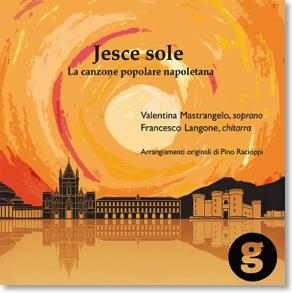giovedì 5 settembre 2013
Review of Jesce Sole La canzone popolare napoletana by Valentina Mastrangelo and Francesco Langone, guitart 2013
I think the popular Neapolitan song represents a " curious style object " or, rather, is a good example of what can be defined as a historic cultural occasion failure .
Unlike other popular genres closely related to a particular culture or geographical area ( the blues of the Mississippi delta , the New Orleans Jazz ... ) the Neapolitan song is not , in my humble opinion, managed to convey in a manner consistent with its essential characteristics without " dreowing " them inside a pseudo -pop in a swamp of poor artistic importance . If blues is been able to renew itself , always offering interpreters of great stature for techniques and styles to carry on the tradition ( now documented in an excellent way ) to the Neapolitan song are missed faces and new voices able to stand on the shoulders of the giants of the past (see Roberto Murolo ) and carry on an artistic journey that has a simply awesome longevity. In the 60s and 70s Pino Daniele and James Senese tried it, but now everything has been submerged by the flta tide of neomelodic singers who have "watered down" and trivialized this heritage. In short, you can not regret if one, after he had stumbled on Nino D'Angelo , Anna Tatangelo, Gigi D'Alessio and Mario Merola decides to change music and you can not always evoke Renzo Arbore to repair certain faults effects.
This album, " Jesce sole" , takes a radically different path from the one outlined above. It starts from the beginning, from the title track composed in the thirteenth century, up to the " Te voglio bene assaje " by Sacco and Campanella, 1839, drawing a perfect evolution of the genre and showing the influences and exchanges with classical music particularly through the songs " La serenata di Pulcinella" by Domenico Cimarosa and "Canzone marinara" by Gaetano Donizetti . The interpreters , Valentina Mastrangelo (soprano) and Francesco Langone (guitar ) create a bridge between the folk tradition and virtuosity and sensitivity by whom has a classical curriculum , getting the best out of the original arrangements by Pino Racioppi. Perhaps all is not lost . There is a rich heritage to be explored further , studying and recovering available to an audience of vast proportions . The Neapolitan folk song is one of our most well-known musical traditions abroad would it would really be now the right moment to let it know with a new garment that could highlight the great melodic gifts and passion.
Iscriviti a:
Commenti sul post (Atom)


Nessun commento:
Posta un commento